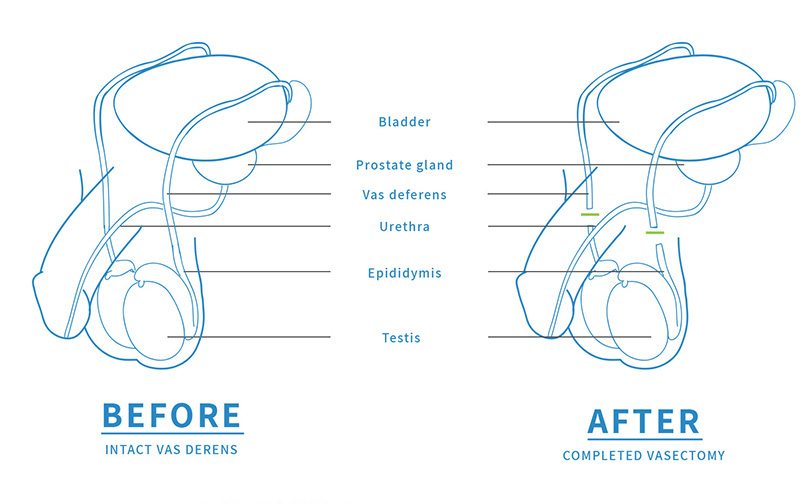Recovery and Romance: How Long After Vasectomy Can You Have Sex?
Wondering “how long after vasectomy can you have sex?” The short answer: typically, you should wait about 1 to 2 weeks before resuming sexual activity, provided that pain and swelling have decreased. However, every person’s recovery may vary slightly. This article will guide you through a more detailed timeline, necessary precautions, and what to expect as you return to intimacy post-vasectomy.
Key Takeaways
- Sexual activity can typically resume 1-2 weeks after a vasectomy, but contraception should continue until sterility is confirmed through a semen analysis 3 months post-surgery.
- Follow vasectomy recovery instructions by managing pain and swelling, watching for signs of complications, and avoiding strenuous activities to ensure a smooth recovery.
- A vasectomy does not affect sexual function, libido, or provide protection against STIs, and men should take precautions, such as using condoms, to prevent STI transmission.
Understanding the Vasectomy Procedure and Healing Timeline

The vasectomy procedure is considered a low risk and effective surgical intervention. It is designed to provide permanent birth control for men. This procedure involves gently dividing the vas deferens and placing a tiny layer of tissue between the two ends of the vas deferens to stop them rejoining. While the thought of having ‘the snip’ might sound daunting, the reality is that recovery times are relatively swift, with most men returning to their normal routines within a week.
Discomfort such as mild aching, bruising, and swelling around the scrotum is fairly common after a vasectomy, but these symptoms usually start to subside a few days following the surgery.
Immediate Post-Procedure Care
Once the procedure is over, the primary concern becomes managing any discomfort that comes post-vasectomy. To soothe the bruising and swelling, you can try the following:
- Use an ice pack to reduce inflammation and keep the area cooler
- Wear supportive briefs or underwear rather than loose boxer shorts
- Paracetomol may help to alleviate any discomfort
These measures can help you feel more comfortable during your recovery.
Bear in mind that rest and relaxation is crucial during this period; refraining from heavy lifting and vigorous activities can help prevent worsening the pain and swelling.
Recognising Signs of Complications
Although the majority of men recover from a vasectomy without complications, it is still essential to stay alert for any signs of potential issues. If you experience fever over 38 degrees, notice blood or pus around the incision, or experience extreme pain or swelling, reach out to your healthcare provider without delay. Though rare, some men may develop chronic scrotal pain or epididymitis, an inflammation of the epididymis, which occurs in about 1 to 3 percent of cases.
Even rarer still are complications like vasovenous fistula, which can lead to blood in urine or ejaculate, or sperm granulomas that might need surgical attention.
Check out our article: Myths and misconceptions about vasectomy
Timing Your Return to Sexual Activity

Resuming your sex life after a vasectomy is a step that should be approached with patience. Typically, the green light to return to sexual activity is given about 1-2 weeks post-operation, provided that the pain and swelling have subsided. However, it’s important to listen to your body; some men may need a bit longer, usually within 1 to 3 weeks, to feel comfortable enough to rekindle their sexual activity.
Also, remember that even though your sex drive remains the same after the surgery, there is still a risk of pregnancy until sterility is verified. Therefore, you should use other forms of contraception during this time.
Read more here: Will I last longer after vasectomy
The Role of Contraception in Early Post-Vasectomy Sex
Diving back into sexual activity after a vasectomy doesn’t mean you can leave contraception behind. It’s a common misconception that men are sterile immediately following the procedure, and this certainly isn’t the case. Until a semen analysis gives the all-clear, indicating no sperm present, it’s essential to use other forms of birth control or abstain from sex to avoid pregnancy.
Even though vasectomies have a high success rate, there’s a small chance of failure due to the reattachment of the vas deferens, which can reintroduce sperm into the ejaculate. Typically, sterility is confirmed through follow-up tests conducted 6 to 12 weeks after the procedure, so patience and precaution are key.
Assessing Post-Vasectomy Sterility: When Are You Safe?
When exactly can you consider yourself completely sterile after a vasectomy? This is one of the most frequently asked questions by men undergoing the procedure. The answer takes time – usually a period of 8 to 16 weeks post-surgery or after roughly 20–30 ejaculations. While waiting for sterility confirmation, it’s important to persist with other contraception methods as sperm can remain in the reproductive system for a while following surgery.
Most men reach a successful vasectomy outcome, defined by having a low sperm count with fewer than 100,000 non-motile remaining sperm per milliliter in their semen, within a few weeks, but by the 12-week mark for sure.
Understanding Semen Analysis Results
A semen analysis is a critical step in confirming that you are sperm free following a vasectomy. The analysis will look for the presence, or rather the absence, of sperm in your ejaculate. The goal is to confirm azoospermia – the complete absence of sperm in semen samples – which is the benchmark for a successful vasectomy. To achieve this, providing an accurate semen sample is essential for the analysis.
Keep in mind that the number of ejaculations after the procedure does not reliably indicate when azoospermia will occur. Hence, discussing semen analysis results with your healthcare provider is crucial to confirm the absence of active sperm before declaring sterility.
Impact of Vasectomy on Sexual Health

Concerns about the potential long-term effects of a vasectomy on sexual health are common but largely unfounded. Men who have undergone the procedure can rest assured that their sexual function, including the ability to achieve an erection and ejaculate, remains unchanged. Similarly, there’s no significant change in semen volume post-vasectomy, as sperm is a minuscule component of the total ejaculate volume.
And for those worried about a drop in sexual pleasure or libido, the evidence is clear: vasectomies do not negatively impact these aspects of sexual health.
Ensuring Comfort During Intimacy
After a vasectomy, the initial return to sexual activity, or engaging in sex after a vasectomy, may come with a bit of discomfort, particularly during the first few ejaculations. To manage this and ensure optimal sexual performance, taking things slowly and easing back into sexual activity can make a significant difference in comfort levels.
Equally important is discussing any discomfort you might be feeling with your partner, as these temporary conditions will generally get better with time.
Protecting Against STIs Post-Vasectomy
A vasectomy is a formidable wall against pregnancy, but it does not shield you from sexually transmitted infections (STIs). The procedure prevents sperm from reaching the penis but does not impact the transmission of STIs.
Given that semen can still transmit STDs even when it is sperm-free, employing condoms and undergoing regular testing are best practices for ensuring protected sex and safeguarding both you and your partner from the risks of unprotected sex and the transmission of infections.
No Scalpel Vasectomy: A Less Invasive Option
For those seeking a less invasive birth control option to the incision method of vasectomy, no-scalpel vasectomy presents an attractive alternative. This technique is minimally invasive with an impressive success rate of over 99%, which stands shoulder to shoulder with that of the traditional vasectomy.
Check out our guide to the no-scalpel/open-ended vasectomy procedure.
Adjusting to the New Normal: Emotional and Physical Aspects
Adapting to life after a vasectomy involves both physical and emotional adjustments. Some common concerns and emotions that couples may experience include:
- Worries about the risks and failure rates of the procedure
- Anxiety about post-surgery expectations and outcomes
- Emotional stress and uncertainty about the future
It is important for couples to have open communication and realistic expectations during this time. By supporting each other and seeking professional guidance if needed, couples can navigate these new waters together.
We've put some helpful tips together in this article: How to help your partner after vasectomy.
As we’ve explored the path from vasectomy procedure to full recovery, it’s clear that while the journey has its share of considerations, the destination offers a profound sense of control over reproductive choices. With proper care, clear communication, and responsible sexual practices, life after a vasectomy can be as fulfilling and intimate as ever.
Frequently Asked Questions
Wait 1-2 weeks after your vasectomy before resuming sexual activity, or until any pain and swelling have subsided.